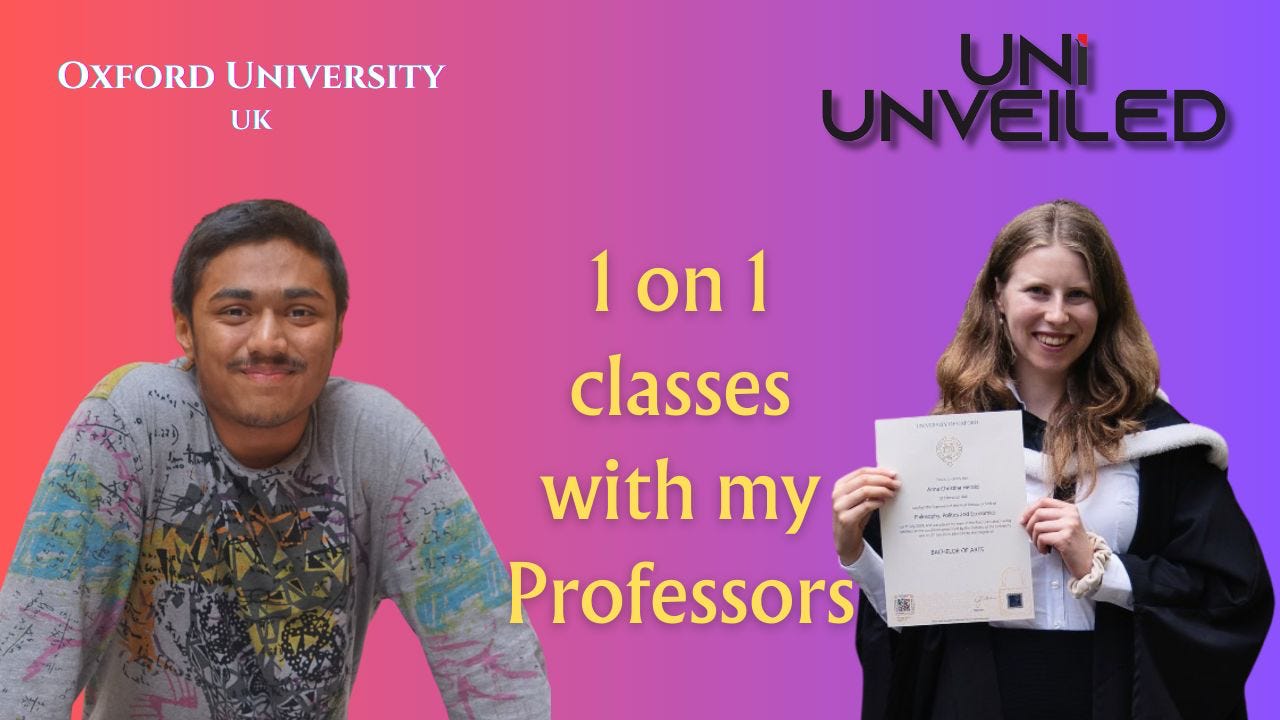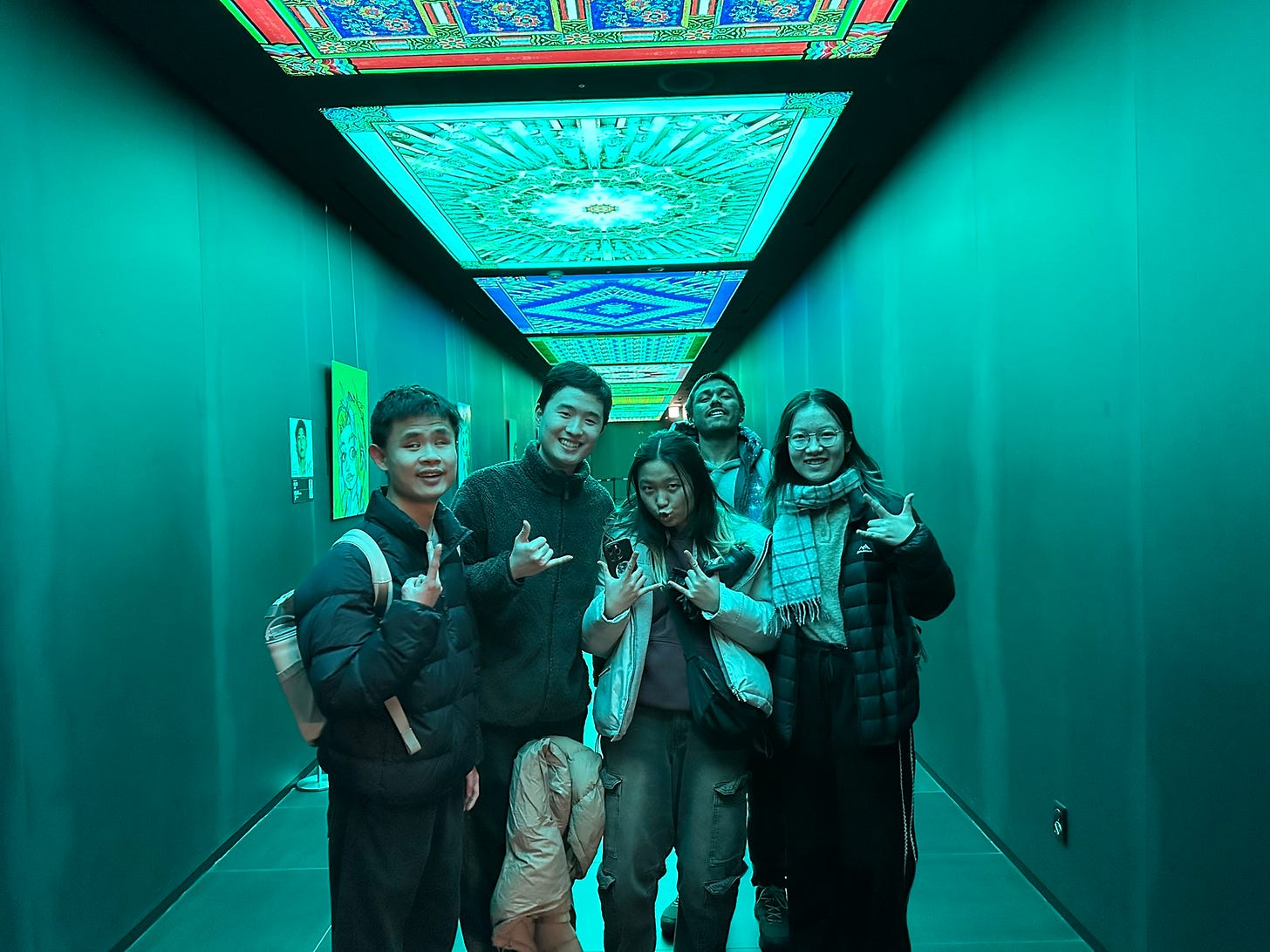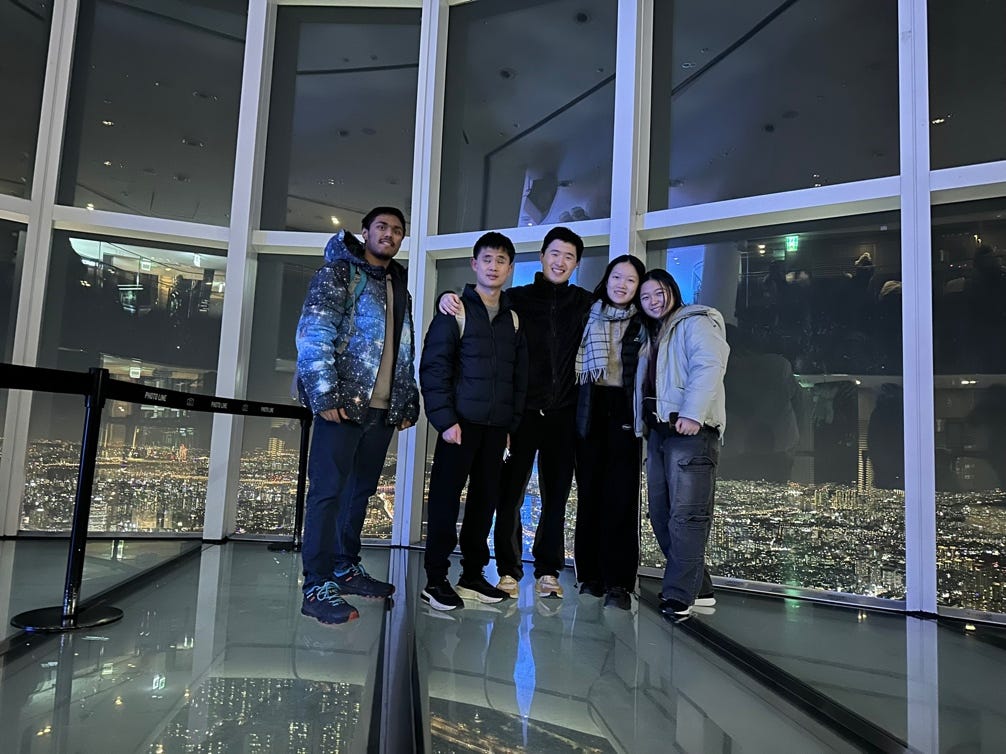Uni Unveiled: Volume 2
Strategically planning out your extracurriculars, cherishing dormitory/hostel life to the fullest, and how to make friends in college.
Episode spotlight: 1 on 1 classes with my professors! | Philosophy, Politics, Economics (PPE) | Christina Herold
It blows my mind that students at Oxford can take classes called ‘tutorials’ which are 1:1 discussions with their professors for the entire semester! Philosophy, Politics, and Economics also seems like such a holistic, qualitative + quantitative skillset to graduate from university with! And what are some tips and tricks for the Oxford application, right from the expert herself?
Some topics we explored during the episode:
· Dealing with imposter syndrome when studying with some of the world’s most brilliant students
· Essay writing tips and tricks both for university applications and during university
· What I loved and what I hated about living in the UK
· How each year at university looks different (goals, challenges, top priorities)
· How to narrow down on your professional interest and specific career paths
If this sounds exciting, check out the full episode here:
University applications: Slaying the dragon
No more cookie-cutter extracurricular activities!
It is way too obvious when you have done something for the sake of doing something. Do you really think that will leave a powerful impact on your dream university when they see those half-hearted attempts doing activities that you don’t truly care about? Extracurriculars are such a beautiful opportunity to let your personality, passions, and diverse talents as a human being shine through on your university application, as a way to better complement (or in some cases, even cover up for!) your academic performance. Every university wants interesting students who aren’t heads-down studying all the time so prove to be somebody who would be interesting for your classmates and professors to chat with beyond the classroom about various topics under the sun!
Less is more. 2 or 3 deep and substantial extracurriculars go a mile further than 9-10 online courses you’ve taken with limited initiative and passion. Time is a huge factor here: try to sustain your activities across the duration of your high school from Grade 9 or 10 onwards till graduation rather than switching activities/projects every few weeks or months. Perseverance is useful to highlight in every activity you’ve sustained for 1+ year because undoubtedly you’ve tackled some challenges along the way.
Niche, niche, NICHE! What are those extremely weirdly specific interests you have in life like the application of cryptocurrency in the music industry, writing haikus about butterflies, investing specifically into x type of company, etc.? Now that’s personality through idiosyncrasy, which helps you stand out from the crowd! Endeavor to stay away from super generic extracurriculars unless they are truly substantial and exciting to you, like MUNs, volunteering at the local church, taking x online course on Coursera or Udemy. Been there, done that. Go down rabbit holes in specific fields that pique your curiosity, combine unrelated interests, and really show that attention to detail and nuance when you engage in some thoughtful extracurriculars.
Take initiative, show leadership. Universities love to see people who step forward and lead vs. the 95% who follow and imitate. In whatever club, organization, band, sports team you are a part of, see whether you can climb up the ladder and take on some position of responsibility and authority. Of course it’s hard, that’s why nobody wants to do it, and that’s exactly why it looks more powerful on your application!
Re-defining community service. Don’t just limit yourself to outright volunteering at an orphanage, animal shelter, or local church. Personally, these activities didn’t interest me much in high school. Broaden the scope by thinking about how you can make positive social impact and tangible change in other peoples’ lives even without physically using your body or being present in a space – even content creation, app development, research projects can contribute to social welfare, its your job to now package that activity with a neat ‘community service’ bubble wrapping to show that the project goes beyond serving your individual needs and goals. Universities love seeing that community service but don’t force it if it doesn’t excite you to go physically volunteer every Sunday – it’s a flexible term so tailor it to your own passions and projects.
Understand the requirements for breadth vs depth. In my experience, most universities outside the US prefer seeing subject expertise and deep knowledge in your intended major. So if you are applying for economics, they would like to see your vested interest in the subject through a combination of books you’ve read, economics research projects, economics internships, etc. – all clustered around a few key fields and skillsets. On the other hand, American colleges (especially liberal arts) love to see applicants who are basketball players but also drummers but also top debaters but also speak 5 languages, because they like a well-rounded personality! Depth vs. breadth is normally an opportunity cost given the time constraints of high school, so be intentional about which one you are prioritizing and why!
Regrets, mistakes, and missed opportunities: You don’t need to learn every lesson the hard way!
Cherish dormitory/hostel life: you may never live next door to your friends post-university!
All the alumni I’ve hosted on my podcast become extremely nostalgic and emotional when they remember their dormitory/hostel life from university. Most of them now live independently, with family, with a girlfriend/boyfriend, but very few live next door to their friends. Especially for readers who have never had the ‘boarding school experience’ before, this is one of the best things to look forward to when you enter college.
Having a roommate is a powerful lesson in compromise, adaptability, and open communication. Stop complaining about your roommate being messy or taking too long in the shower or having the opposite sleep schedule to yours. Think of this experience as being training ground for life after university which you may spend with a romantic partner, children, maybe your parents. Sharing a room with a sibling or even another kid back in middle school was different – at university you are all grown adults and hence the dynamics become more interesting and sophisticated. Every roommate journey is so unique and special so I don’t want to share specific advice here, just embrace this opportunity with gratitude and as an excuse to also learn more about yourself and your needs in a relationship. Treat this as a chemistry lab and have some fun experimenting!
It’s a privilege to be able to walk down the hallway and knock on your best friend’s door. After graduation, you all may be living in different cities or countries and probably will have to work around time zones to schedule calls with each other once a month with great difficulty. Don’t take for granted the beauty of this college campus which allows you to be within walking distance of your close friends. Go knock on a friend’s door more frequently just to check in, maybe even experiment during your first week with knocking on random doors on your floor and making some new friends. Living 24/7 with certain people who share your building and its amenities is such a simple excuse to diversify the people you talk to at university: don’t miss out on that small talk in the elevator, when brushing your teeth at night, or just bumping into one another at the water fountain. This small talk could very well be the blossoming of a lifelong friendship and you would never know unless you just start with ‘Hi, how are you doing?’
24/7 entertainment. What I love most about living with Minervans is that at any time of day (yes, even 3:30 AM!), I will find certain Minervans doing something fun in a common area of our residence hall. Especially if you are living on campus with only other college students, enjoy the liberty of being able to make some noise even late into the night. Sleep schedules are crucial but every rule is meant to be broken occasionally, right? You will be able to hang out with different groups of people depending on the time of day you visit the common areas of your building, ie. the 5 AM running team, the 2 pm cooking gang, the 2 AM party girls, etc. Use this to your advantage and get to know more people in your dorm by being dynamic with what time of day you choose to relax and hang out in the common/fun spaces.
Coming of age
Rain and snow and bird poop falls from the sky, but not opportunity
Back in high school, I used to bluntly say ‘no’ to opportunities that were presented to me on a golden platter – an online course my father wanted me to enroll in, a public speaking opportunity my teacher proposed to me at school, a friend reaching out to start a school club together – opportunity was a dime and dozen and all in front of me. At least in my experience, it’s nearly the complete opposite at university. I am chasing opportunities eagerly every day, sometimes getting so out of breath that I just can’t keep chasing anymore. Nobody will tell you what to do at university – your friends are all mature and independent adults and they expect the same from you, your parents are probably in a different city or country, and your professor probably doesn’t even know your name. I am not saying this to scare you but to prepare you mentally for this ‘go-getter’, ‘hustler’, ‘scouting’ mindset which will serve you so well at university because this is the time to create your own luck. There is untapped potential on every square inch of campus – the question now is how will you reach the gold that lies below the dirt even if it is with your two bare hands?
Leverage the cross-domain expertise and talents of your classmates. On your single dormitory floor, I can guarantee you that you will find a budding author, an experienced programmer, a seasoned entrepreneur, a human calculator, and a biology geek. Your classmates have all gotten into this school because of a few signature strengths and domain expertise they possess, which makes them the top 5% on campus in at least one specific niche. Hence, college is absolutely the time to build ambitious projects, start-ups, even musicals, because you have cross-domain talent concentrated in such a tiny geographical space that it seems almost destiny that you all work together to build something. Many of your classmates are also eagerly searching for their potential co-founders, co-researchers, co-authors at university so why not you take the first step and start building up your army? Young and ambitious energy isn’t motivated by solely a paycheck so if you can’t pay your team, put in the thought and effort to find even stronger incentives for people to join like personal growth, social impact, or even future financial compensation. Of course, if everyone in the world was a founder, we would have no teams – don’t feel pressured to be the initiator always, there is no shame in joining a team or project initiated by others especially if you feel the founders have more experience, insight and wisdom than yourself, which you can benefit from being exposed to.
No question, no answer. How will somebody give you an opportunity if they don’t even know you are looking for one? If you don’t ask me a question, of course I won’t just blurt out an answer to your face. People need to know what kind of opportunities, experiences, and projects you are looking for – be a walking talking billboard to your professors, classmates, mentors, friends, industry professionals. Share with them your goals and then let serendipity do the magic. I am generally unafraid to make a bold and direct ask like for a connection, opportunity, or internship. But if that feels too daunting for you there are more subtle ways to make that ask such as:
· I’m trying to find more industry professionals to mentor me in x field. If anybody ever comes to your mind, I would be so grateful if you could help me with a warm introduction!
· I’m currently building x project and struggling with x aspect of the project. If you ever have any interesting ideas or solutions, I would love to have a deeper conversation with you!
· This summer, I am hoping to work in x industry / x company. If there is any way you are willing or able to support me along this journey, I would be much obliged!
When somebody visualizes your face or says your name, what are the top (professional) keywords that come to their mind? I am pretty sure if you asked any of my classmates they would associate my face/name with words like ‘podcasting’, ‘creative writing’, ‘content creation’, ‘storytelling’, ‘newsletters’. Try this exercise with your friends and see what comes up – find the alignment gaps and see how you can be more crystal clear on what kind of opportunities you are looking for. This helps because tomorrow if any of my friends befriends a famous podcaster and is willing to do me a favour, they know that I would be interested in that warm introduction.
You build a network before you need one. I love this idea because it also combats the idea of transactional or superficial networking which involves using another person as a means to your end. Be genuine about it. If there is any classmate, professor, industry professional, even a PHD student at your university who seems interesting to you regardless of what major/field/career they are pursuing, put in the effort to reach out and schedule a 1-1 interaction with them, over coffee, lunch or even a walk in the park. Without ulterior motives, begin slowly building your personal and professional network while at university, understand what different peoples’ goals are, and also just get to know them as human beings, empathetically and lovingly. Spend time with people who you enjoy learning from and hanging out with. As you build depth in your friendships, try not to compromise on breadth – set yourself a goal of having perhaps 1 deep conversation per week with somebody you’ve never spoken to before. And then when the time comes for you to build your ambitious project/company you already have relationships which you have sincerely invested into and can now lean on these people for their own talent or the connections they can provide to you. I would be much more willing to write an article for my friend’s company if he asked me tomorrow than another classmate who has only ever said ‘Hi, how are you?’ to me in the hallway – it didn’t take my friend much more than just a couple lunches, days out and regular check-ins. Your gun should be loaded before the battle begins.
Knowledge in action > Knowledge on paper
Finding a friend, building a friendship
I am a huge proponent of natural and accidental friends, but I’m equally a huge believer in the power of intentionality which in my case has been a powerful way of converting acquaintances into friends and turning friends into lifelong friendships. Everyone is busy with their own lives, goals and work in university and of course, so are you. Hence, I believe there is a level of discipline and purpose it takes for one to intentionally cultivate richer friendships during this time. What I will share below is not a mechanical guide or an exhaustive checklist for building friendships, rather think of these as practical tips and suggestions to add to your toolkit which hopefully can serve you in being a better friend and hence, in creating a better friend in the other person as well.
· Conversation starters. That initial conversation can be the most intimidating and awkward. And what aggravates this painful experience is that we all are limited to such basic, boring, bland conversation starters like ‘How are you?’, ‘Where are you from?’, ‘What classes are you taking this semester?’. I personally dislike all of the above, I prefer diving right into a conversation with more energy, passion and depth. Experiment with questions like ‘So, working on anything exciting these days?’, ‘What’s the best thing that happened for you this week?’, ‘What’s the best piece of media you’ve consumed recently?’. Not too deep like ‘So what’s your biggest fear?’ because you just met the guy, but also not so shallow that it takes you 5+ minutes to even get deeper than that surface-level interaction. Spend 5 minutes on ChatGPT and it will give you some amazing conversation starters to add to your toolkit, take what you like and forget the rest.
· Check-in on something important they mentioned to you in your last conversation. If taking quick mental or physical notes helps, do it. Because people absolutely love it when you remember what they told you during your last interaction and you ask them about it even weeks or months later – it shows you truly care. Ask them how that project/romantic relationship/internship has been going and show them that you remember the details of your last conversation. This will also help you avoid repeating the same question which they have already answered and go one level forward in your understanding of them as a human being.
· Pass something along, add some value to their life – The blunt truth is that all human interactions are about value: not necessarily professional/career value but some kind of value – physical, emotional, spiritual, gossip, sports, some value which both people add to each other’s lives. Provide your friend something of value at regular intervals because again it shows that they are on top of your mind. For me the easiest way to do this is to pass along the media I consume to my friends whenever relevant – any good book, podcast, movie, which I think would be interesting to a specific friend because I remember they are interested in x thing, I share it with them followed by a message that tells them why I specifically think they will enjoy this piece of content. Great ideas aren’t like apples, sharing them doesn’t leave you with any less.
· You may need to sometimes engage in activities which they enjoy and you enjoy less. Because its not about the activity, its about the person. Bust this myth of having to make friends through shared hobbies/passions because that just limits your circle. Make friends based on shared energy, vibe, goals, personalities, expressions of love instead. Join along in an activity which they truly enjoy because they will be eager to teach a new skill to you and you will get to also learn something new + it creates an excuse to spend time together on a regular basis because they anyway love that activity so much that they engage in it periodically. Of course, the same expectation then applies the other way – that your friends also will sometimes join along in activities which you enjoy more than they do, because again, they are coming for you, not the thing.
· Travel with your friends – Once you’ve gotten comfortable/close enough with another person, travel is a great way to cement and exponentially deepen a friendship. When you spend a few days together with a person and observe them in different contexts (driving, hiking, exploring a new city, anything) you also learn so much more about the other person, as a holistic human being outside of the campus. Travel is a great excuse to create shared memories together and document through photos and videos which help create nostalgia – another key ingredient of deep friendships.
· Lastly, give them deep feedback, both praise and critique. This comes at a later stage in any friendship when you both feel vulnerable and trusting enough in each other that there is an open give and take of feedback. Praise and critique are both powerful and hold their own unique value and role in every friendship. Deeply expressing how much a friendship means to you and what value the other person adds to your life at regular intervals is integral. And so is critical feedback which your friend may not want to hear but needs to hear – as you observe the other person more deeply and with much less ulterior motives than an employer or work colleague, you have the power to be a crucial mirror to your friend and help them improve in ways that will benefit their lives outside of this friendship. Know how much sugar-coating is required based on your friend’s personality and also be aware of the right timing to give critical feedback, but please don’t avoid it altogether. If you’ve built a strong enough foundation with your friend, there should be no worry of an ego clash because your friend should clearly know (and you should explicitly communicate) that you are on the same team here.
Fun times…
As you continue networking, applying to summer internships and acing your classes, don’t forgot that university is also the time to drink, party, travel, play board games, watch movies and enjoy your campus life – you are not a robot whose life is measured by KPIs!
To conclude, here’s a fun picture of what I’ve been up to in Seoul over the past month with dear friends:
123rd floor of Lotte Tower, the tallest building in South Korea.
Less fear, more love….






